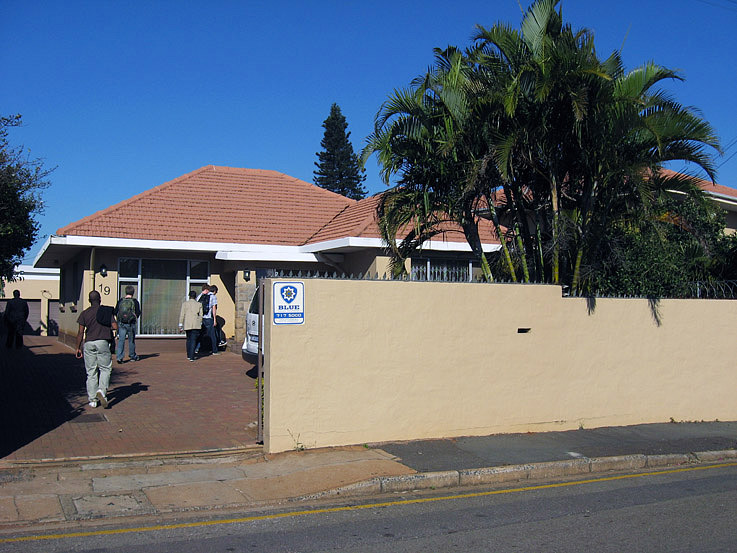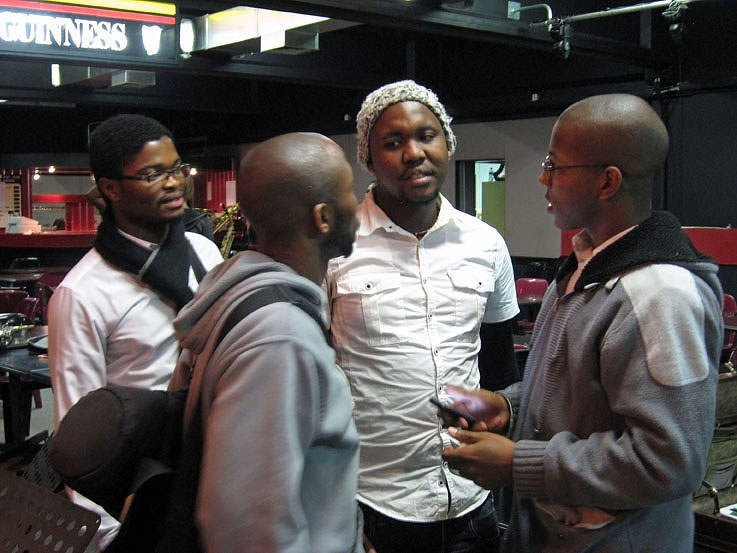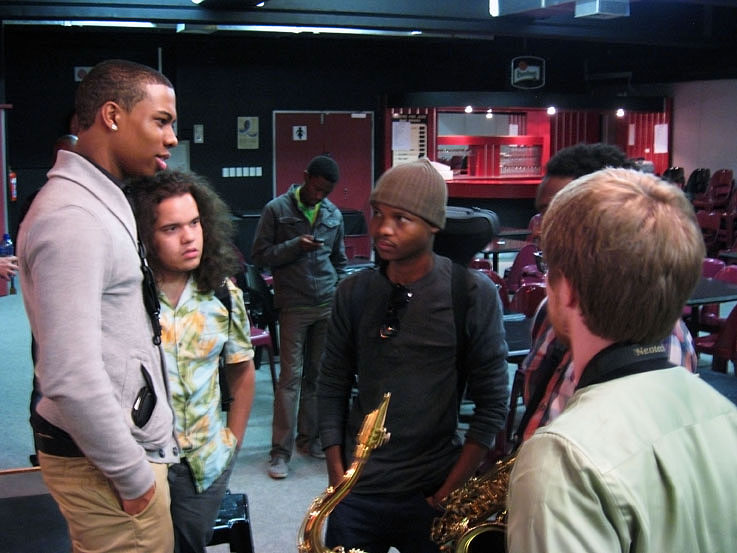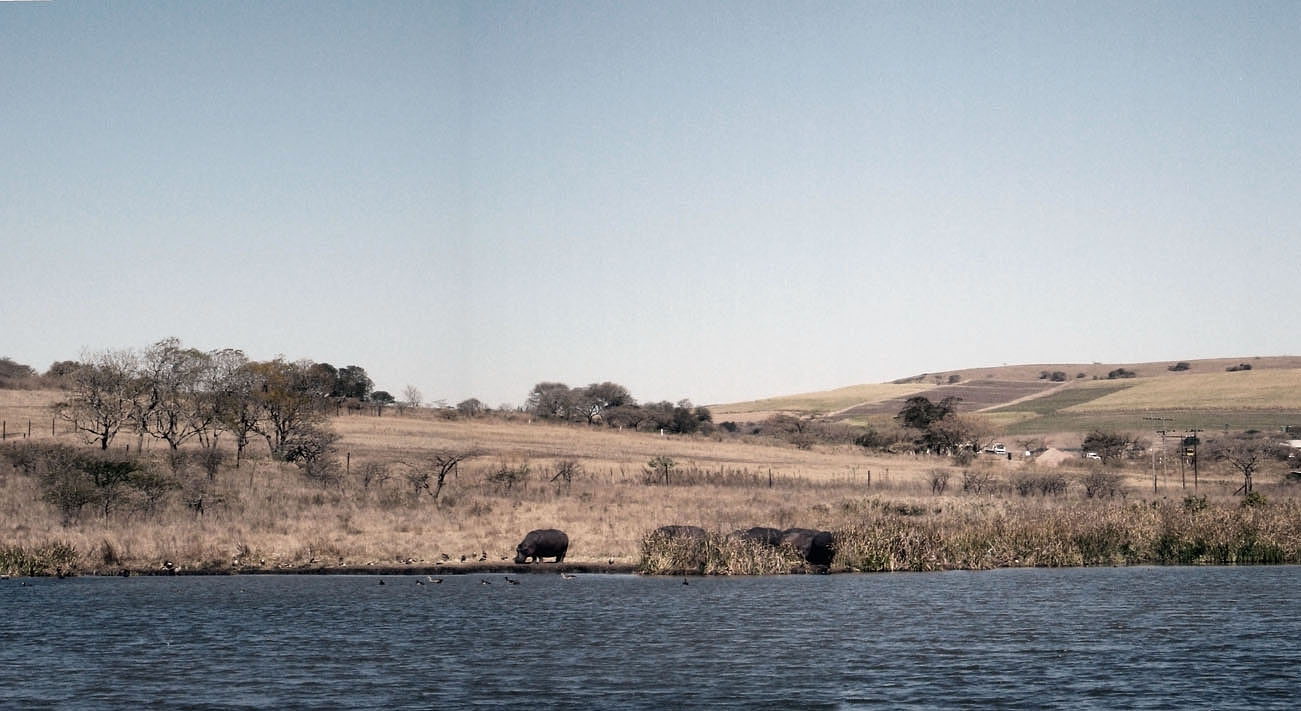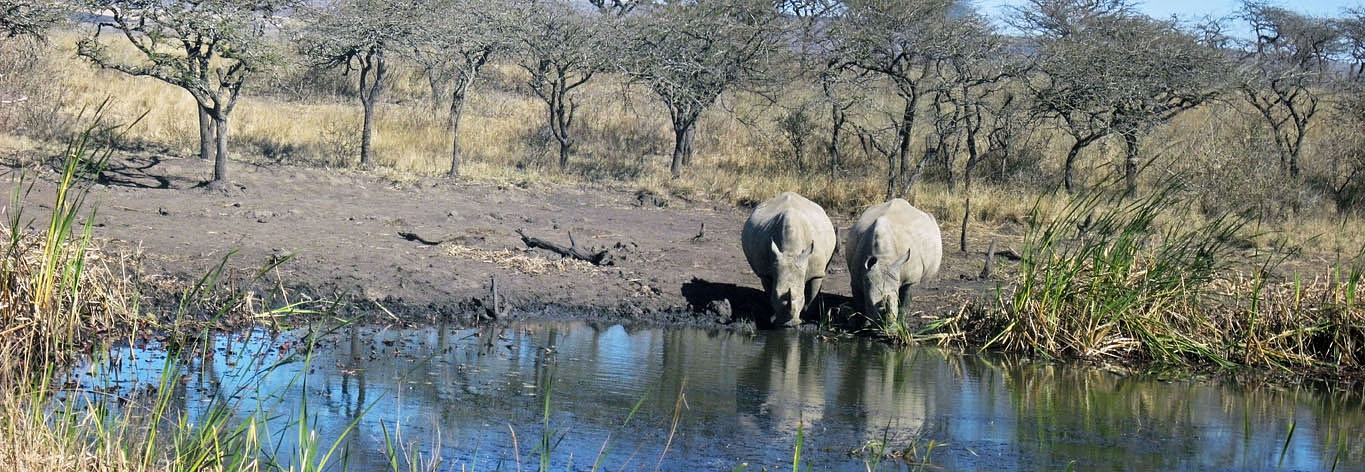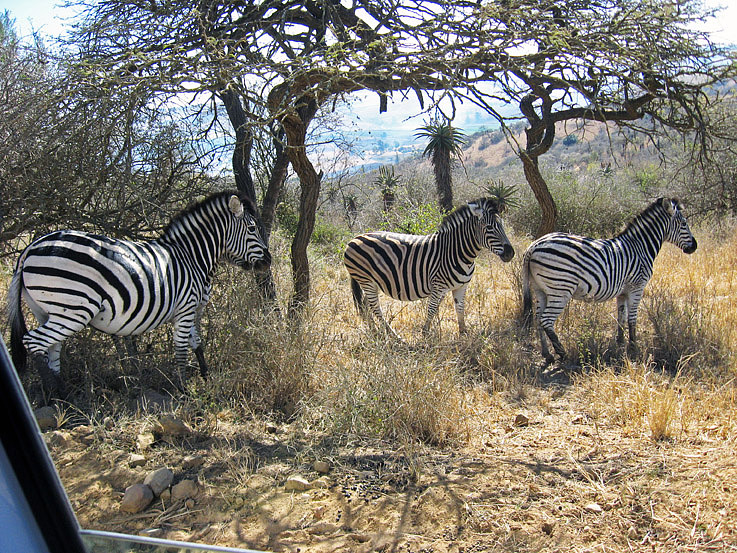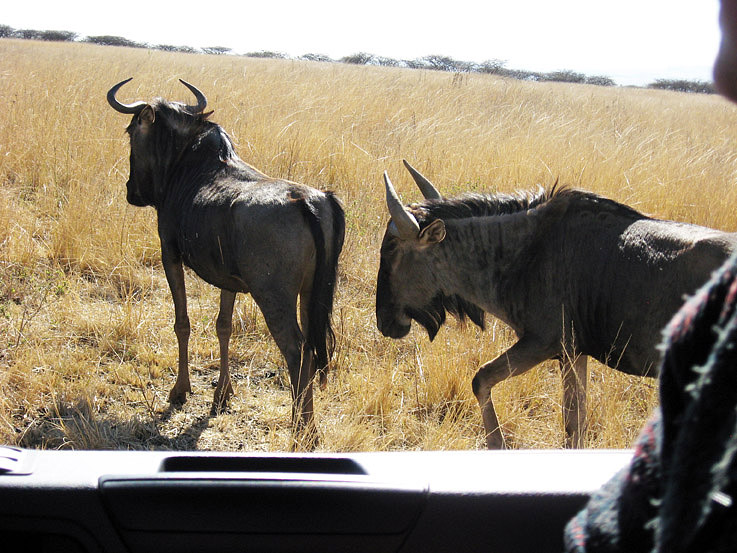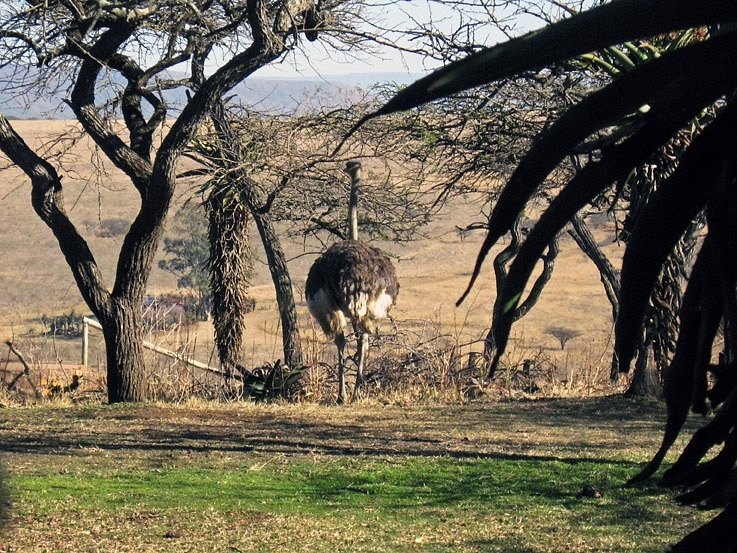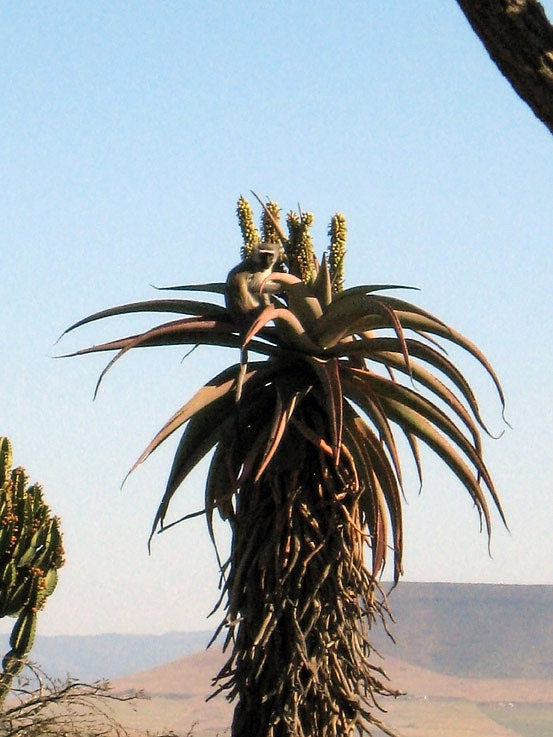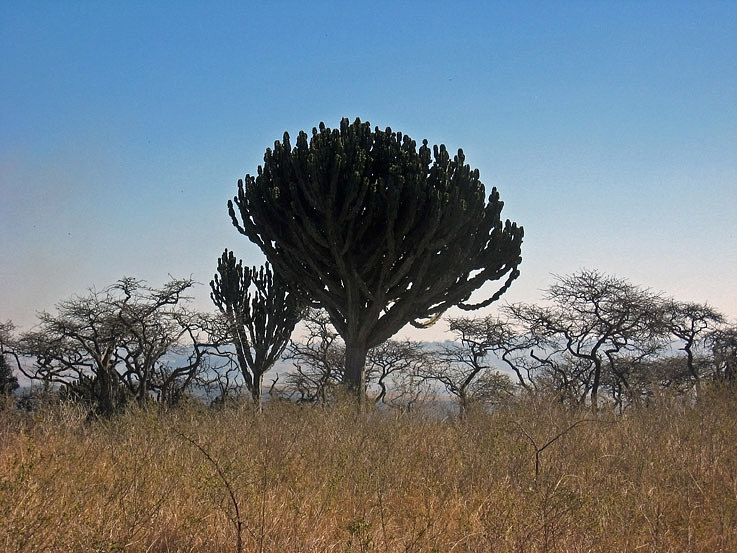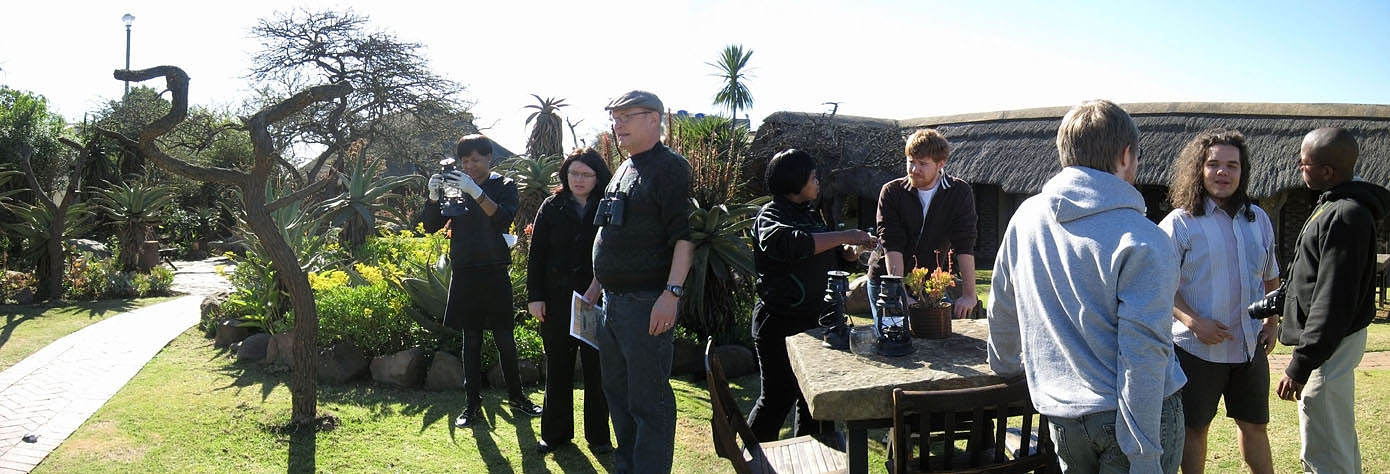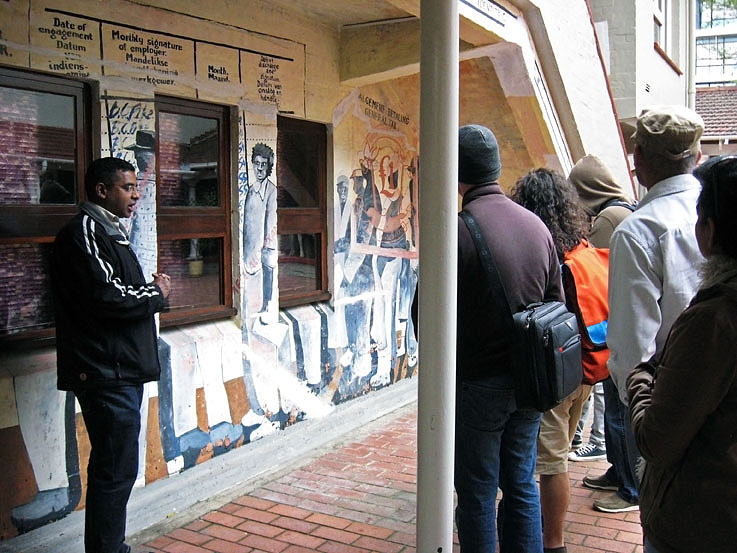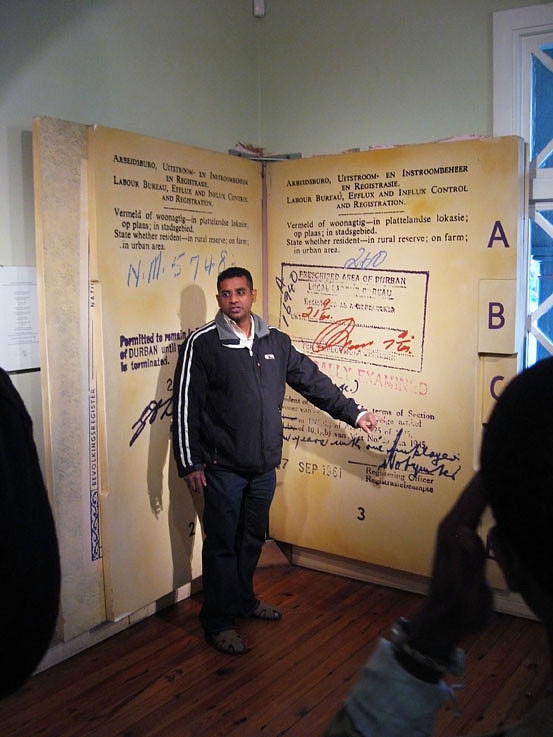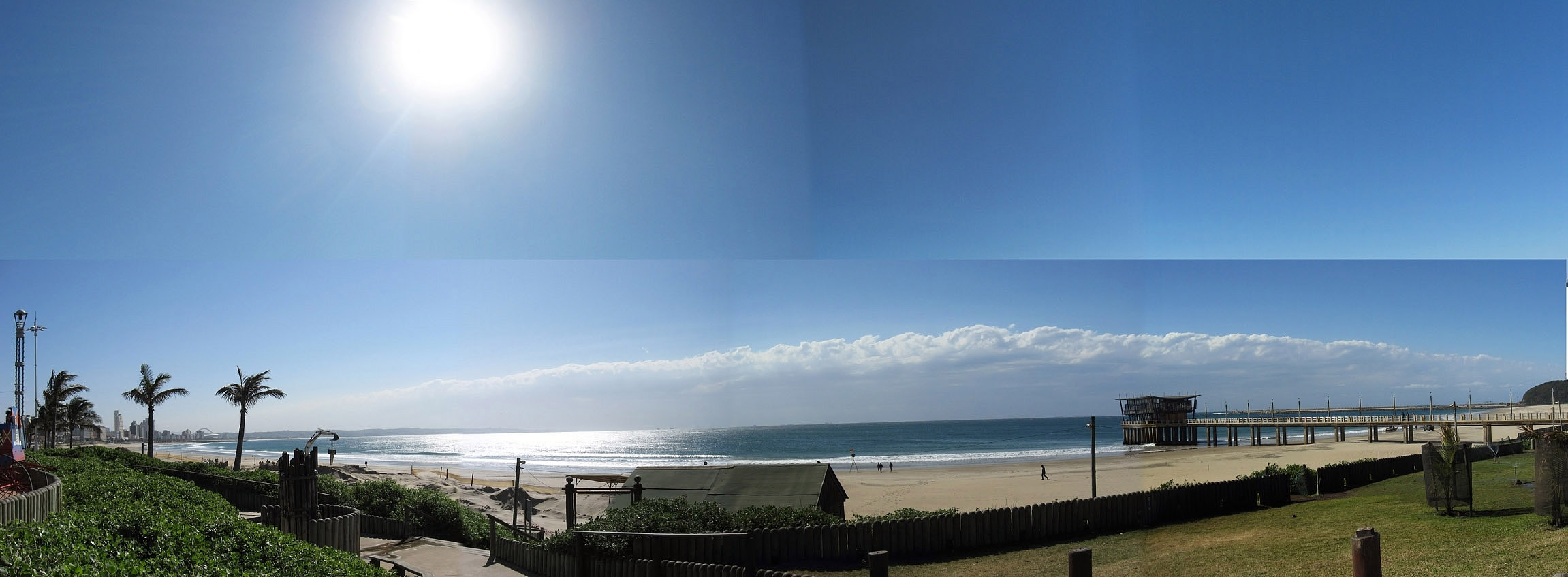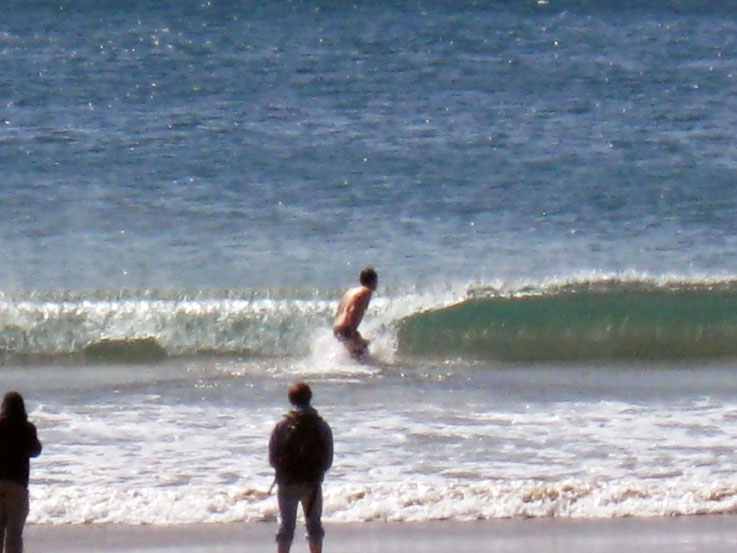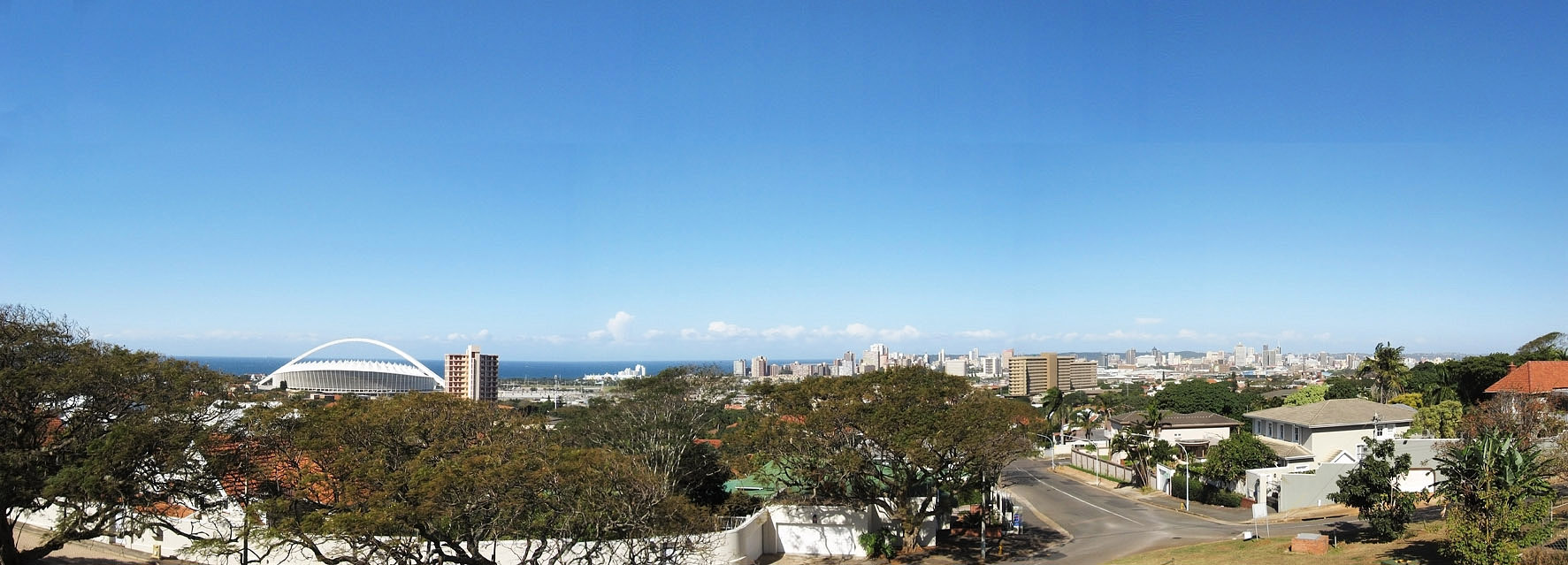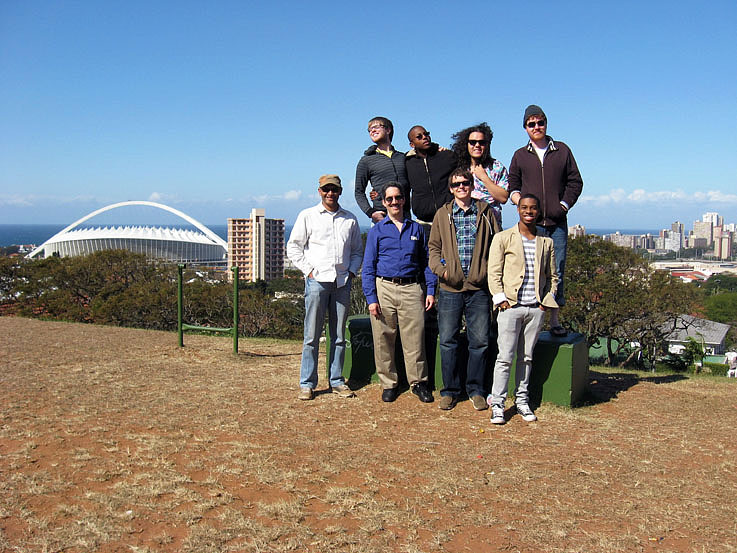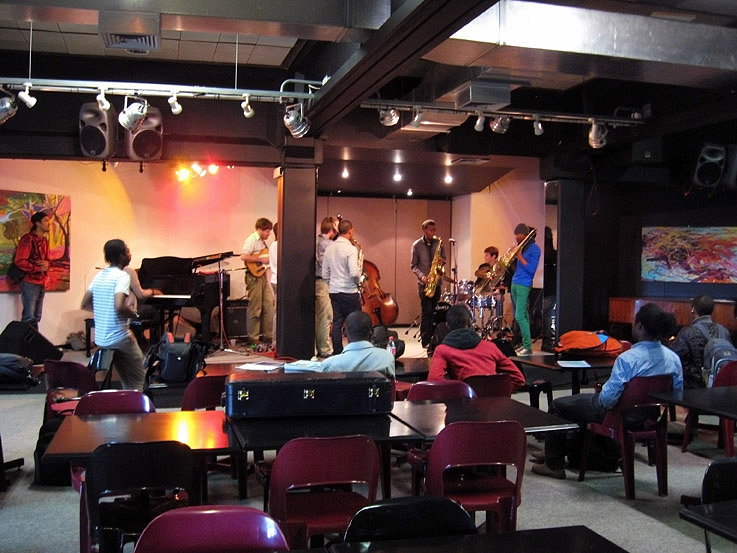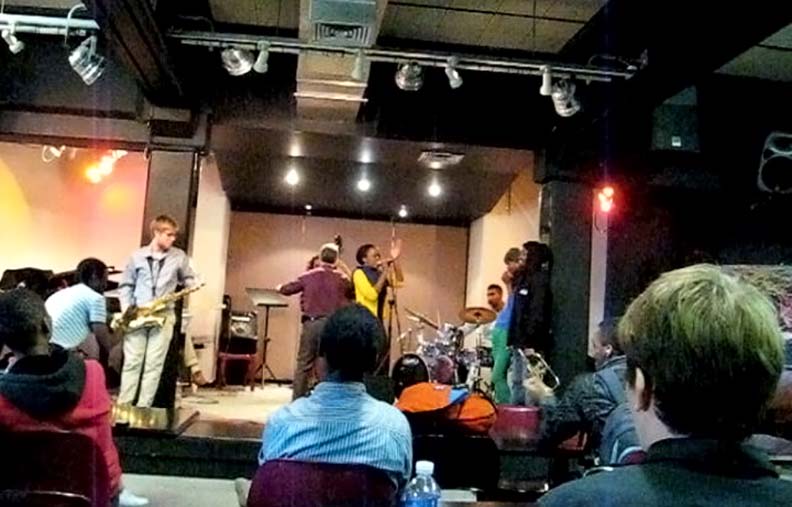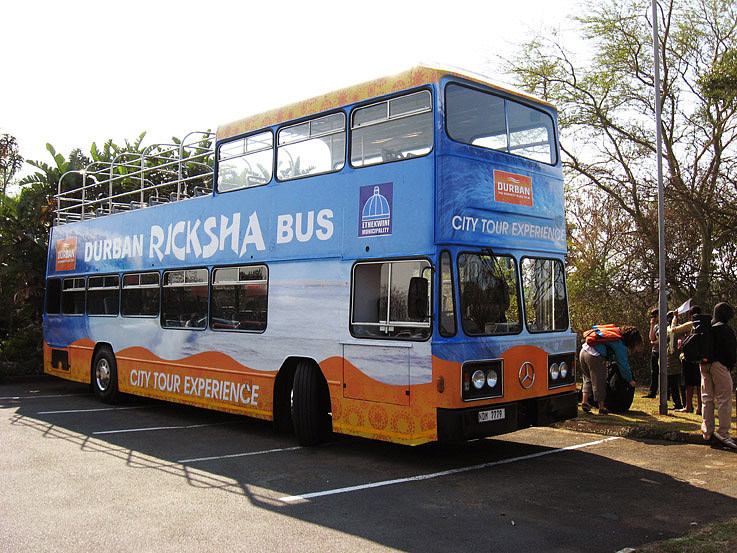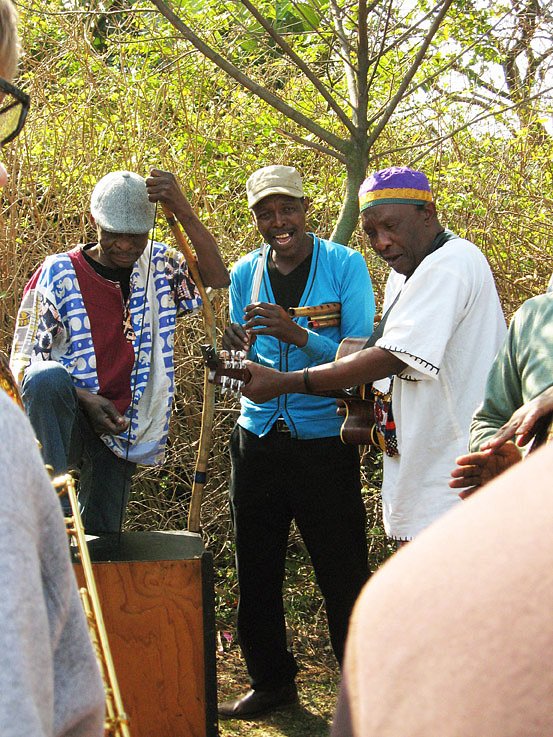Trip 1: VCU Jazz visits South Africa (July/August 2012)
Greetings!
If you would enjoy a visual travelogue of VCU Jazz’s recent travels to South Africa, read on!
BACKGROUND
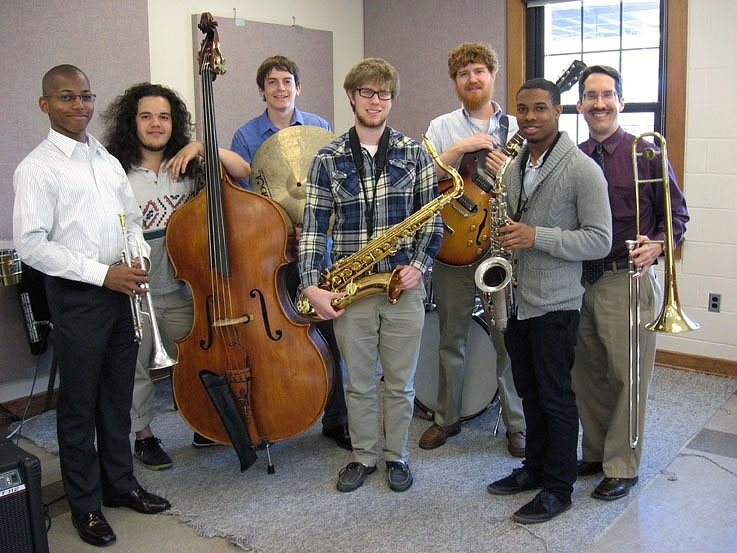 Victor Haskins (trumpet), Justin Esposito (bass), C.J. Wolfe (drums), Brendan Schnabel (tenor sax), Chris Ryan (guitar), Trey Sorrells (alto sax), and Prof. Antonio Garcia, Director of Jazz Studies (trombone)
Victor Haskins (trumpet), Justin Esposito (bass), C.J. Wolfe (drums), Brendan Schnabel (tenor sax), Chris Ryan (guitar), Trey Sorrells (alto sax), and Prof. Antonio Garcia, Director of Jazz Studies (trombone)
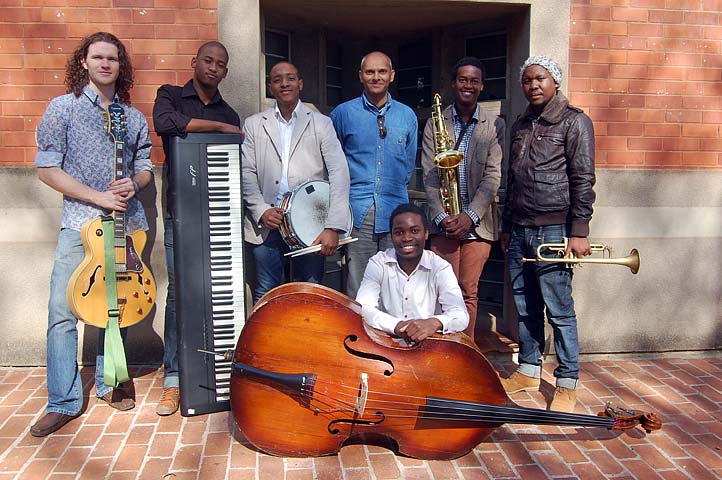 Sebastien Goldswain (guitar), Lungelo Ngcobo (piano), Sphelelo Mazibuko (drums), Prof. Neil Gonsalves, Director of UKZN’s Centre for Jazz and Popular Music (piano), Linda Sikhakhane (tenor sax), Sakhile Simani (trumpet), and Ildo Nandja (bass)
Sebastien Goldswain (guitar), Lungelo Ngcobo (piano), Sphelelo Mazibuko (drums), Prof. Neil Gonsalves, Director of UKZN’s Centre for Jazz and Popular Music (piano), Linda Sikhakhane (tenor sax), Sakhile Simani (trumpet), and Ildo Nandja (bass)
As you may already know, VCU Jazz received an “International Partnerships Major Initiatives Award” (IPMI), a grant I wrote (and with excellent guidance from others) to bring American and African citizens together in musical and personal understanding. VCUarts generously matched the grant. Titled “VCU and the University of KwaZulu-Natal: A Jazz Bridge to Greater Understanding,” this grant project will bring together students and faculty of the Jazz Studies Programs of Virginia Commonwealth University and the University of KwaZulu-Natal in Durban, South Africa over the course of this VCU academic year. Here are some links to UKZN, if you wish:
http://www.ukzn.ac.za
https://music.ukzn.ac.za/Academic-Programmes/Jazz-Studies
Researching the parallels in racial/cultural divides in our respective cities, Richmond (the former Confederate capital) and Durban (in a country only recently having outlawed apartheid) is a must. I firmly believe that since all music comes from people, and all people come from a culture, understanding music requires a better understanding of people and their culture.
MONDAY, JULY 30
We stayed Sunday through Thursday nights at “Amaciko Home Of The Musos,” a B&B founded by jazz saxophonist Mfana Mlambo for other musicians to stay in when they visit. It was clean, pleasant, and efficient.
 From the front entrance, looking in.
From the front entrance, looking in.
After breakfast we headed to the campus, a 10-minute walk guided by UKZN Prof. Neil Gonsalves that we could then do on our own during the week. Though it was the dead of winter in Durban, that meant lows in the 50s and highs in the 70s; so it was no inconvenience for Richmonders beating the summer heat of the U.S.
After getting UKZN guest IDs (a must for security), we started a soundcheck for our midday concert. Most of the musical activities for our week would take place in UKZN’s Centre for Jazz and Popular Music, which had a deck overlooking one side of Durban.

I had invited one of the UKZN students, trumpeter Sakhile Simani, to sit in with the VCU Combo on my own composition for the occasion, “Mango Criollo” (named after the mangos that often go into my favorite mango sorbet).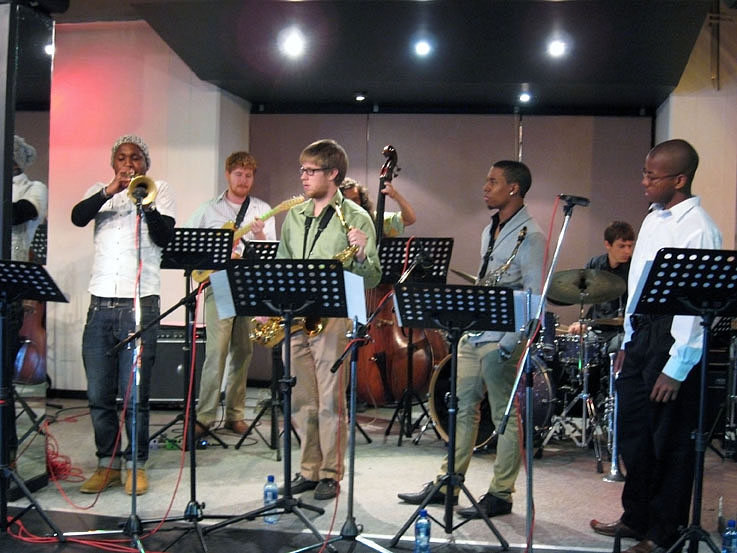
The concert was well-attended and enthusiastic.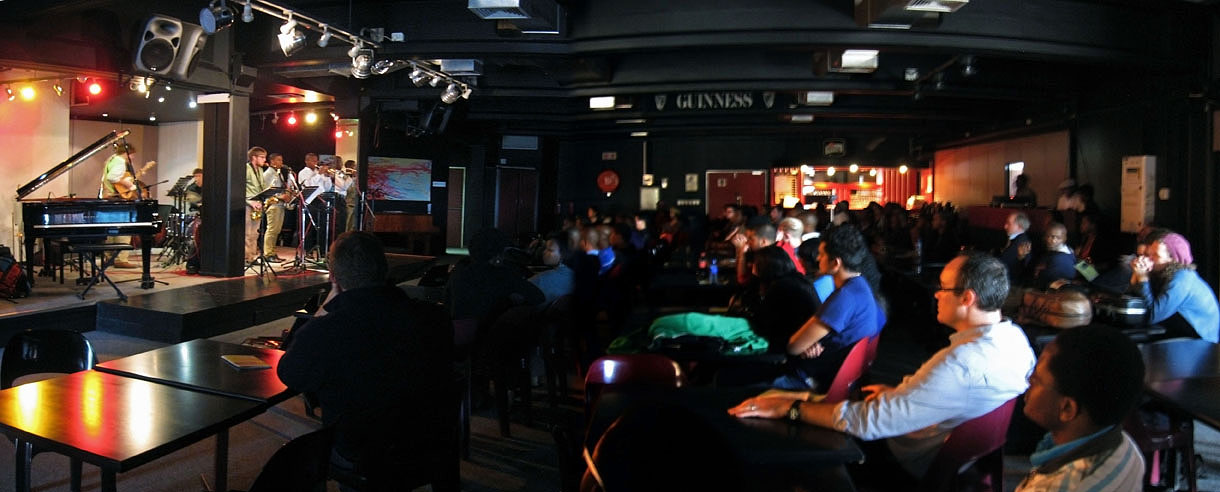
We also invited Prof. Gonsalves to sit in on piano on “Green Dolphin Street.”
Neil had arranged a reception after the concert for us with the UKZN faculty and combo students to meet each other.
Prof. Neil Gonsalves, left center, welcomes all to the VCU/UKZN reception including (from right) Dr. Jeffrey Robinson, guest lecturer Efrain Toro, head of school Dr. Jorgen Brauninger, and (in front of table) Dr. Salim Washington.
The students indeed chatted it up, then and throughout the day.
Our drummer, C.J. Wolfe, also enjoyed the opportunity to talk with Efrain Toro, who has performed with Stan Getz, George Benson, Los Lobos, Chicago, Kiss, Placido Domingo, and more.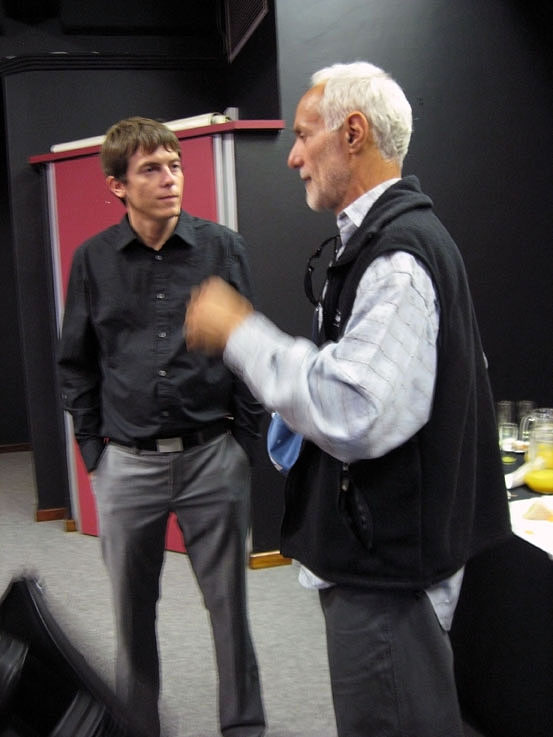

We proceeded to join the Composition and Arranging ensemble in Prof. Demi Fernandez’s office, where our students joined in with UKZN students in reading through several charts by current and former UKZN students.
 A joint UKZN/VCU Big Band rehearsal followed, under the direction of Prof. George Mari. Part of the time I played in the trombone section, and then I led the band through a couple of charts and assisted their styles.
A joint UKZN/VCU Big Band rehearsal followed, under the direction of Prof. George Mari. Part of the time I played in the trombone section, and then I led the band through a couple of charts and assisted their styles.
TUESDAY, JULY 31
We rose at 5a for breakfast and our 6a departure with Dr. Jeff Robinson, who is quite the authority on area flora and fauna–and loves to visit the wild whenever possible! So we were most fortunate to have his services as a guide. I had met Jeff a decade ago at the South African Jazz Educators Conference, and it was a pleasure to reconnect.
Tala Game Reserve was ridiculously affordable: only $70US for an eight-passenger van to enter. And it proved to be a wonderful experience, not only in terms of being introduced to the land from which we all sprung but also musically. As I mentioned within my grant proposal to VCU, “having once been on safari, I can attest that for a musician it can be a life-changing experience to hear the wildlife sounds that have inspired the foundation of so many wind and percussion instruments now in use today. It speaks to Africa’s musical roots.”
I’ll share just a few of the countless photos I shot.
At one point we stopped at the Reserve’s reception area, which was also lovely, to make a rest stop and visit with the staff there.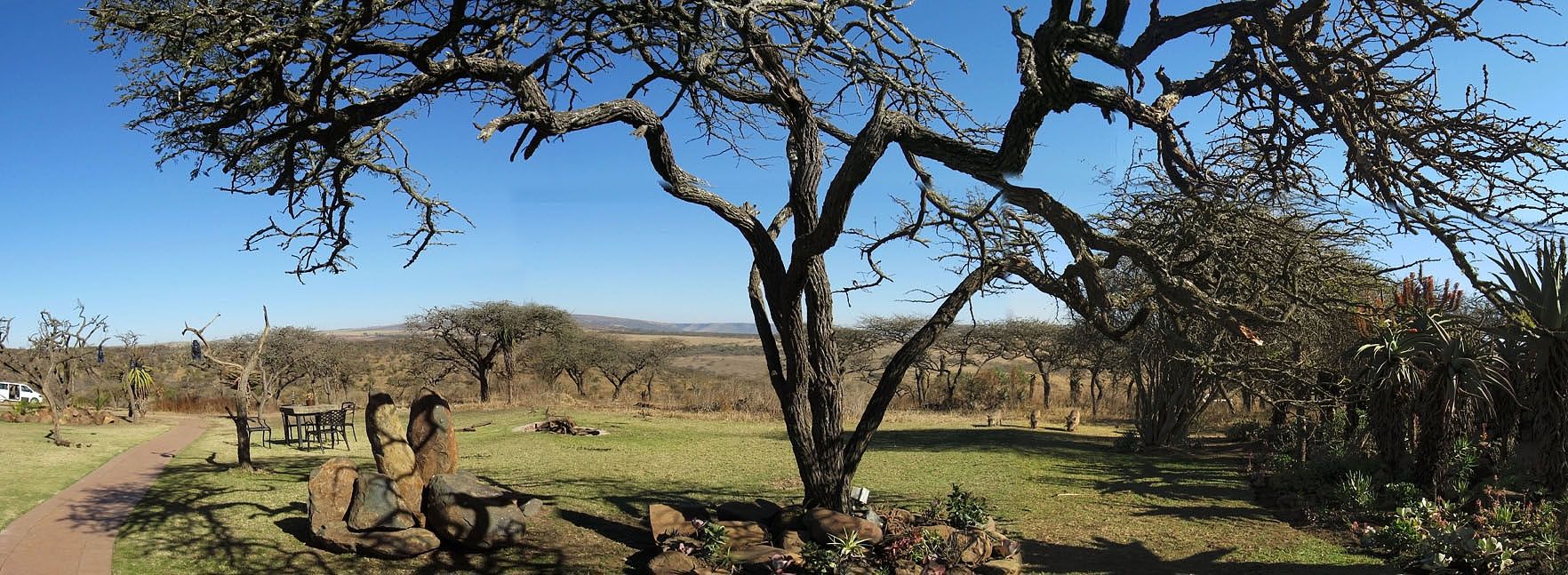
It was a great day of nature.
 Dr. Jeff Robinson, left, with VCU students at Tala Game Reserve.
Dr. Jeff Robinson, left, with VCU students at Tala Game Reserve.
On the drive back Jeff also introduced us to some of the area’s low-income shantytowns (which as it turned out we would revisit later in the week).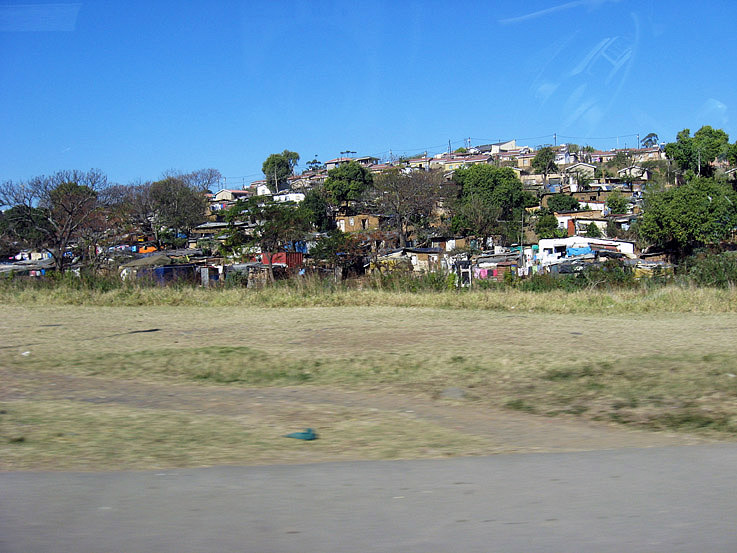
We reorganized at the B&B and then returned to the Centre for Jazz and the Performing Arts to hear a duo of a current bass student and former voice student perform. They call themselves “Two Can Play That Game.”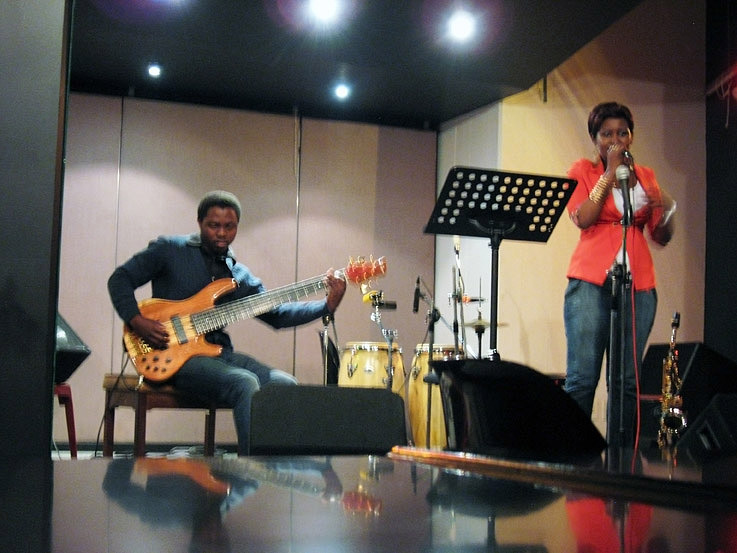
She sang with a strong gospel tradition, and he delivered a wide range on his seven-string electric bass. They combined with other musicians on various tunes to vary the musical setting. And when in a vocal duo, the guest vocalist delivered superb bass lines while the host vocalist scatted.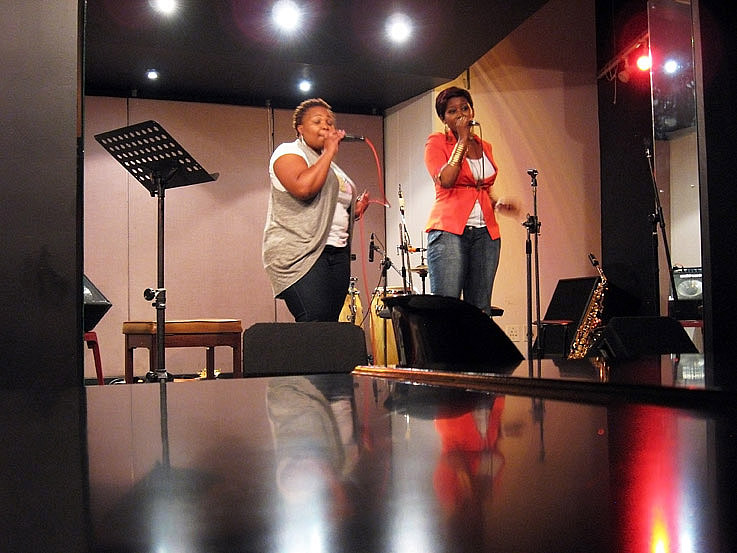
After the show ended at 7p or so, the students went their way for dinner at a place called “Amsterdam.” Neil and his wife, Nareen, were extremely kind to invite me out to a seafood dinner at the coastline. Durban is Africa’s largest port.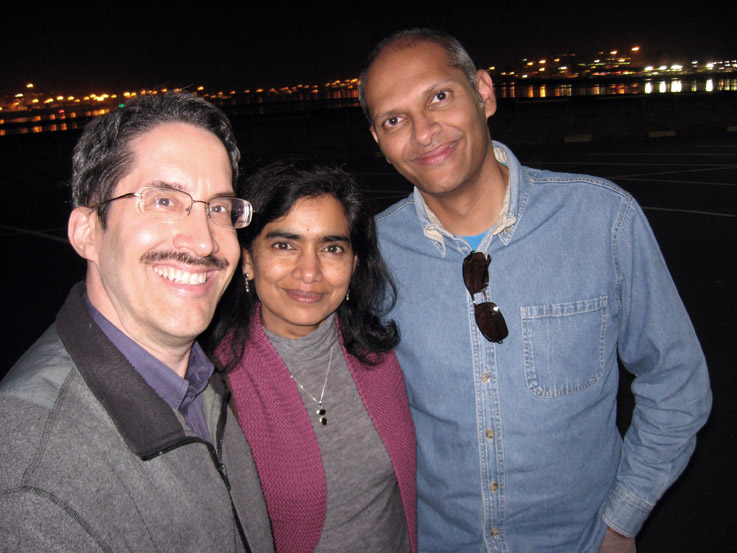
It was a delicious meal–and great company along the coast!
WEDNESDAY, AUGUST 1
This day began with a close look at painful chapters in South African history, a history that has parallels in U.S. history and struck close to home even in Richmond. We visited the Kwa Muhle Museum in Durban. (The most representative web site would seem to be.) This had been the site of many injustices inflicted upon Africans by Natal’s white residents, who required Africans to relocate out of town, register for local employment, and be subjected to numerous indignities in order to receive that registration. Known as “The Durban System,” these processes were later adopted in large part by the nation as it entered into apartheid.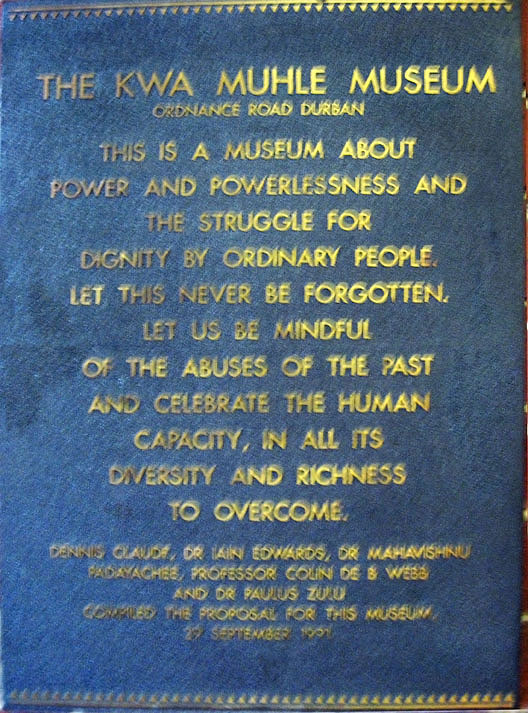
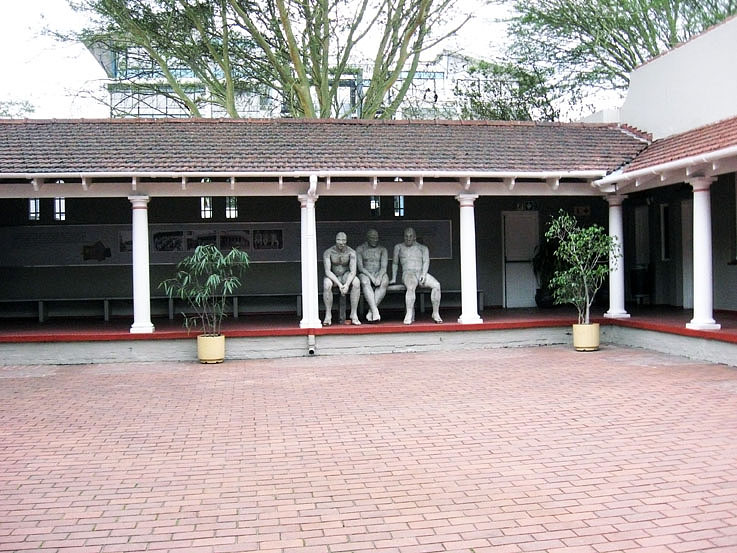
We learned only after our return to the U.S. that the above sculpture, “Shadows of the Past,” was actually a commissioned work created by a VCU Sculpture graduate! South African artist Ledelle Moe returned to her hometown of Durban to create the work between her first and second year of grad school at VCU.
The exhibits were informative and disturbing–perhaps more disturbing because they served as blatant reminders of similar human rights violations thrust upon citizens elsewhere in the world, including at home.
Our guide informed us, as Jeff Robinson had a day earlier, that many South Africans are not currently aware of their rich botanical heritage, of herbs that can be used medically, and more. So the garden in the courtyard of the museum is dedicated to that natural heritage of healing.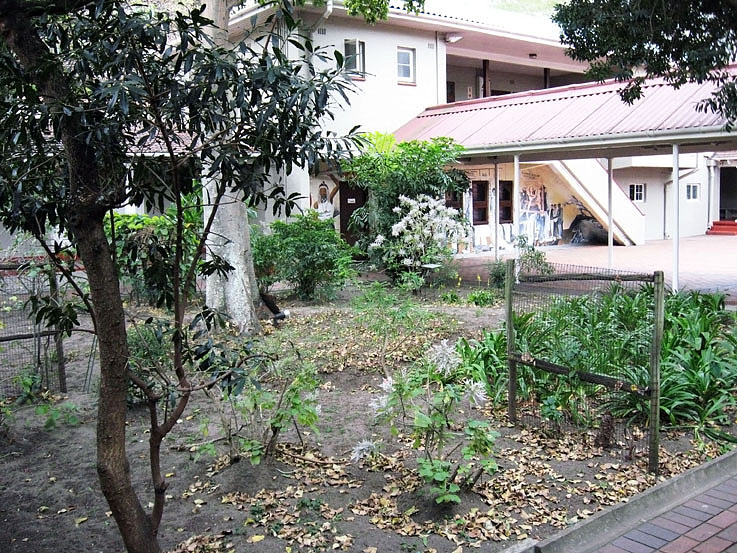
It was time for stark contrast to the morning. Neil and Nareen drove the seven of us downtown to uShaka Marine World. Admission to the beach and shops are free, which worked for us. And it was a beautiful beach.
Though a mild winter by our standards, they told us that the Indian Ocean would be warmer than the air temperature. And C.J., our drummer, was not going to leave Durban without getting in.
He reported that the water was indeed warmer, thankfully.
After shopping and dining, we regrouped and drove a scenic route back to UKZN, seeing the impressive soccer stadium built downtown for the recent World Cup.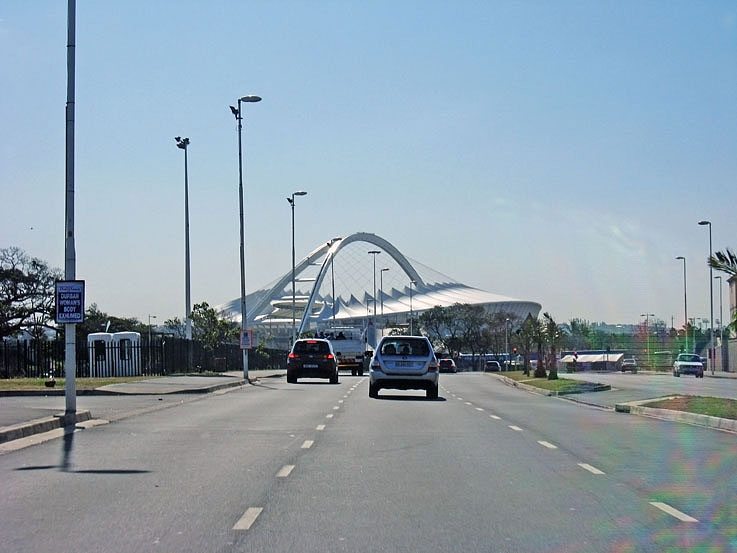
And we stopped at an impressive lookout spot over the coast.
We reorganized once more at the B&B and then headed to the Centre. I delivered the students to a workshop by Prof. Sazi Dlamini on Madala Kunene’s “Maskanda” style of South African music, and there they got the chance to experiment playing various indigenous instruments. Meanwhile, I met with several UKZN faculty to dialogue about topics shared by both their school and ours: curriculum, resources, recruiting, promotion and tenure, and more.
While the students went on to a jam session shared with the UKZN students, Neil and I worked on installing some software on his computer that will allow the two schools to collaborate over the internet during the intervening months.
Students and faculty reunited at the Centre for a fine concert at the Centre by UKZN jazz vocal alumna Vanessa Moodley and her “Van Band.” Her style of singing was less gospel-influenced than the previous night’s vocalist. She was superb as well and brought the house to life with a closing piece that was South African-influenced.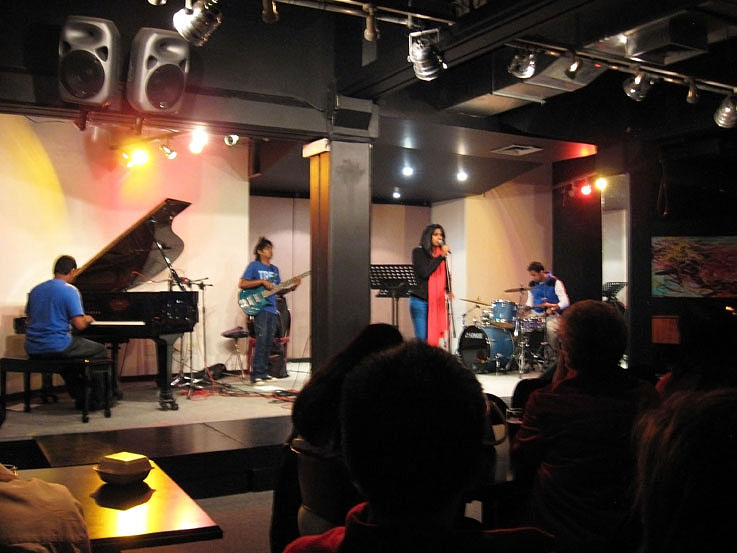
The VCU students, Neil, Nareen, and I closed the night out at Yossi’s Moroccan Cafe, where a good meal was had by all.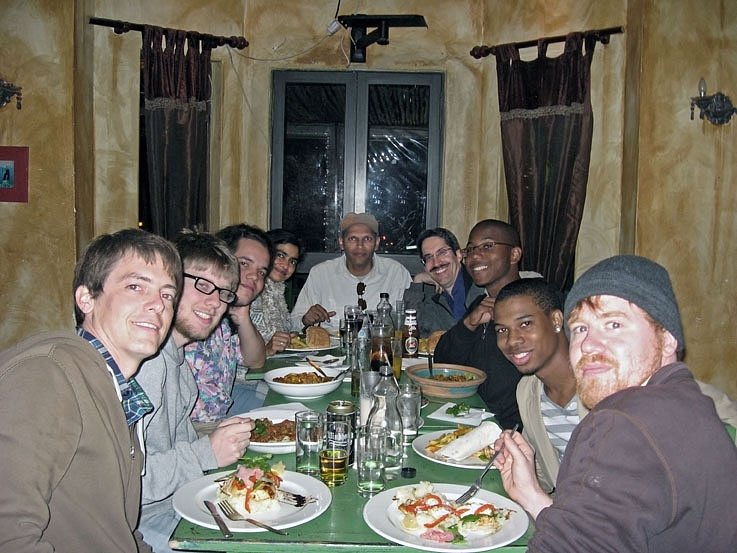
THURSDAY, AUGUST 2
Our musical day began with a workshop by famed percussionist Efrain Toro, who gave us an inspirational and thought-provoking exploration of rhythms and grooves.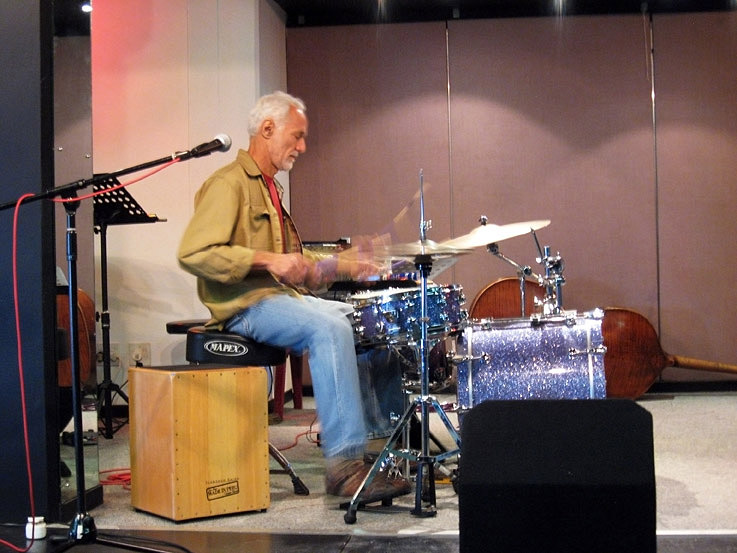
He also played recordings of two tracks that he believes reveal most about the relationship of samba to all music: “Livros” by Caetano Veloso and “Na Biaxa Do Sapateiro” by Caetano Veloso. After the great workshop he posed with all attending.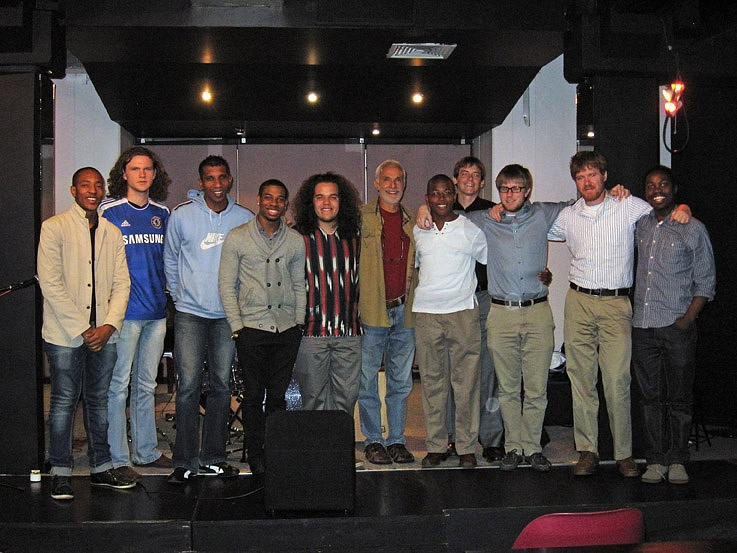
Lunch was our choice of vendors along the coastline facing the school, a lovely site from which to dine.
And then it was time for another student jam.
Having observed only male instrumentalists participating, at one point I escorted up to the stage a UKZN vocalist I’d already met, Hlengiwe Ntombela, who scatted a great blues solo that inspired everyone.
I spent some time working with Neil on his software installation, and then it was time to soundcheck for the evening performance. The UKZN faculty opened.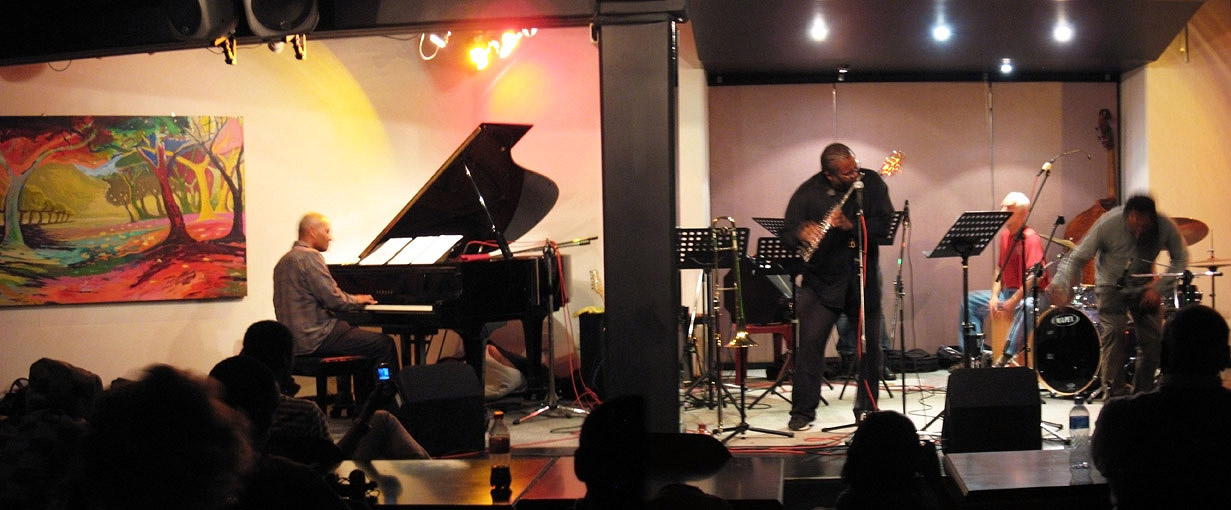
Neil Gonsalves (piano), Salim Washington (flute), Efrain Toro (cajon), Sazi Dlamini (pea pods).
Neil and Efrain sat in with the VCU contingent for a while
And then the students and faculty intermingled their personnel.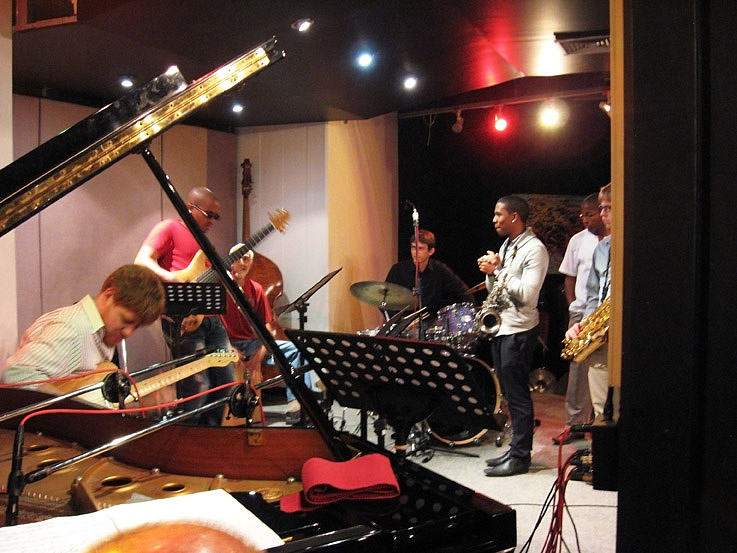
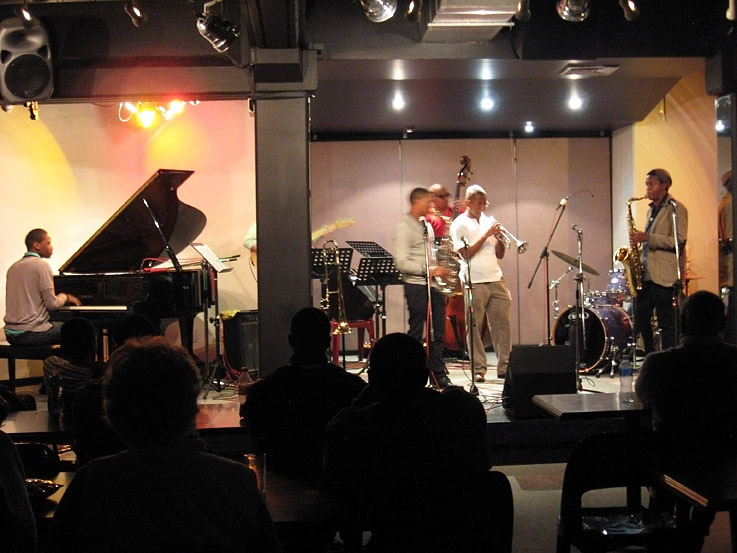
And at the end of the concert, just when we thought it was over, our B&B host, Mfana Mlambo, leapt onto the stage with a borrowed sax and commanded our drummer, C.J., to “PLAY!” And they created one intense, fast, avant-garde jazz duo together that garnered enthusiastic applause to close the evening.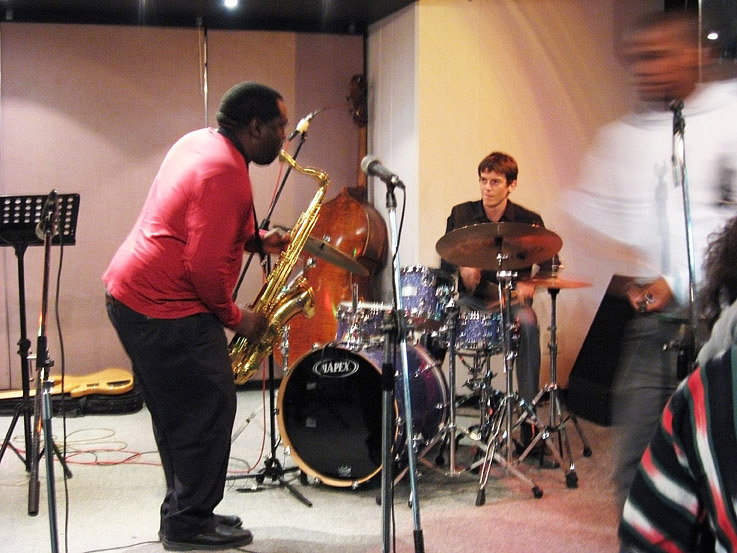
This was especially moving because Mfana had been in a car accident only a few weeks prior that had damaged the nerves in one hand. His doctor had advised him not to play for a while longer, but Mfana said he was inspired by the music of the evening to jump up and join in.
We were grateful that a representative from the U.S. Embassy in Durban attended the evening. And the students continued to make new friends, as evidenced by this photo:
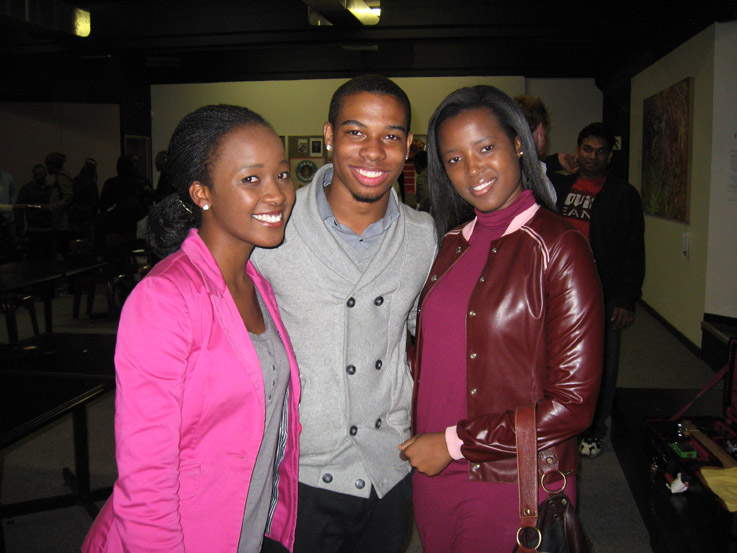 Hlengiwe Ntombela (UKZN vocal student), Trey Sorrells (VCU alto sax), and Snenhlanhla (UKZN student).
Hlengiwe Ntombela (UKZN vocal student), Trey Sorrells (VCU alto sax), and Snenhlanhla (UKZN student).
The VCU students, Neil, Nareen and I then had dinner at a noodle restaurant to complete the night before heading to the B&B to pack our things.
FRIDAY, AUGUST 3
Plenty was ahead before flying home. First up was a session combining VCU and UKZN students in reading through a couple of existing compositions by Dr. Sazi Dlamini, who has been commissioned jointly by VCU’s grant and by SAMRO (the South African music rights organization) to compose new music for the VCU combo for our March concerts on both concerts and subsequent CD.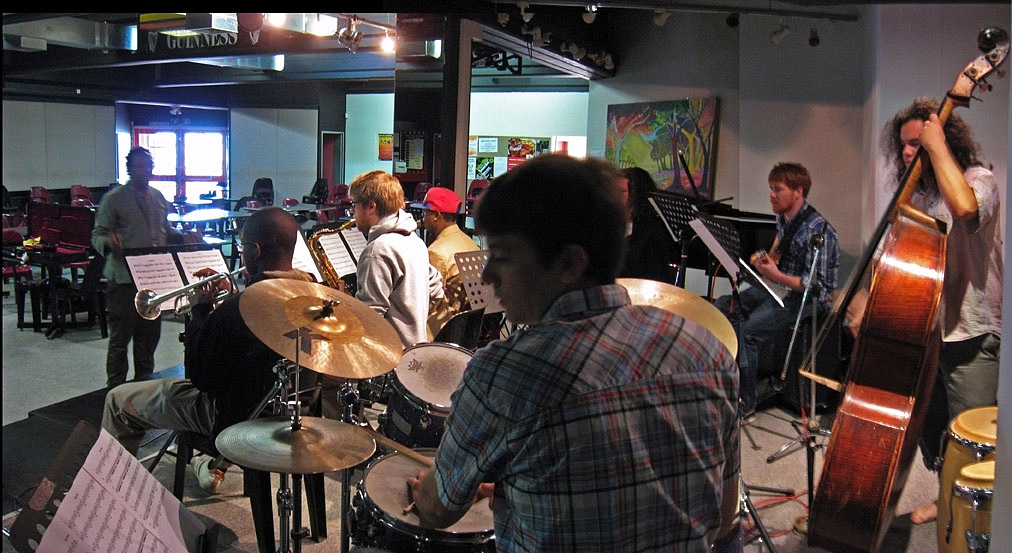
The two pieces, “Ummangali” (Xhosa for “the accuser”) and “Iqhude” (a word referring to the ceremony in the Ndebele tradition surrounding a young woman’s coming of age), were joyous and inspirational, whetting our appetites for what he will pen for us in the future.
That morning a woman was sitting in the rehearsal room that I had not yet met. She was Nomusa Xaba; and she had been waiting to meet me, not having been able to catch me after the previous night’s concert. She wanted to present me with a book about her life and a CD by her South African husband, Ndikho Xaba. Her family’s history in Africa and the U.S. brought her ancestors through Richmond and slavery; so her story is especially pertinent ().
To our surprise, we discovered we had known each other twenty years ago: she had served as an administrative assistant to the Music Dean while I had begun my initial years teaching at Northwestern University in the early 1990s. We were amazed to run into each other a half a world apart!
During this very special week of our visit, Sazi Dlamini had been inspired to create an additional experience for us. He had been scheduled to lead another presentation regarding Madala Kunene’s Maskanda/folk style; but instead, he worked hard and came up with funds to bring us Madala himself–along with a bus to bring us on a tour of the neighborhoods that inspired Madala’s music.
As we had learned earlier in the week, white political leaders had forced native Africans out of their homes near Durban, moving them further out of the city. As Madala narrated the drive on mic in his local tongue from the lower deck on, Sazi sat on the upper deck with us, translated Madala’s words, and pointed us visually in the appropriate directions.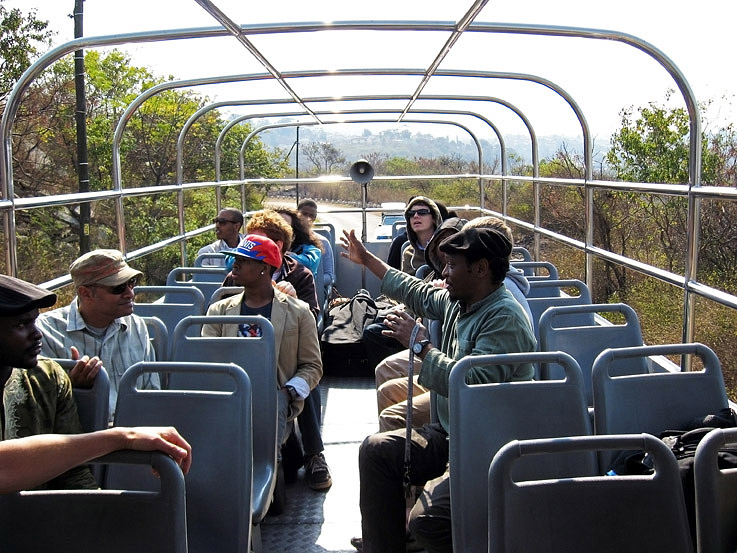
Madala described his childhood neighborhoods as we drove past what was now either open green spaces or newer buildings that had replaced his bulldozed environs. And then he directed us towards the shantytowns that currently exist. 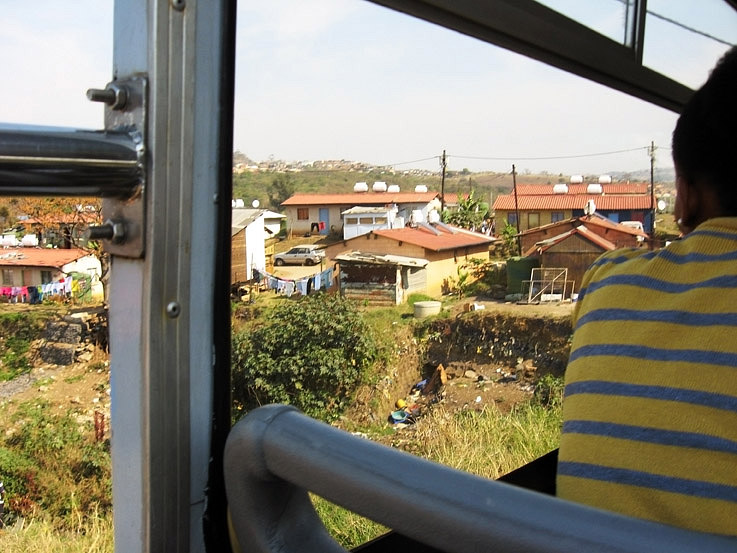
Some of Sazi’s students had joined us on the tour, and one of them revealed to us that he had lived in one of these very shantytowns for years before very recently finding a means through music to move out and into Durban.
When we returned to campus, Madala and Sazi, along with Sazi’s older brother Njeza and their younger friend on penny whistle, S’phelele, led us through learning several traditional songs by ear as we gathered on the grass by the bus.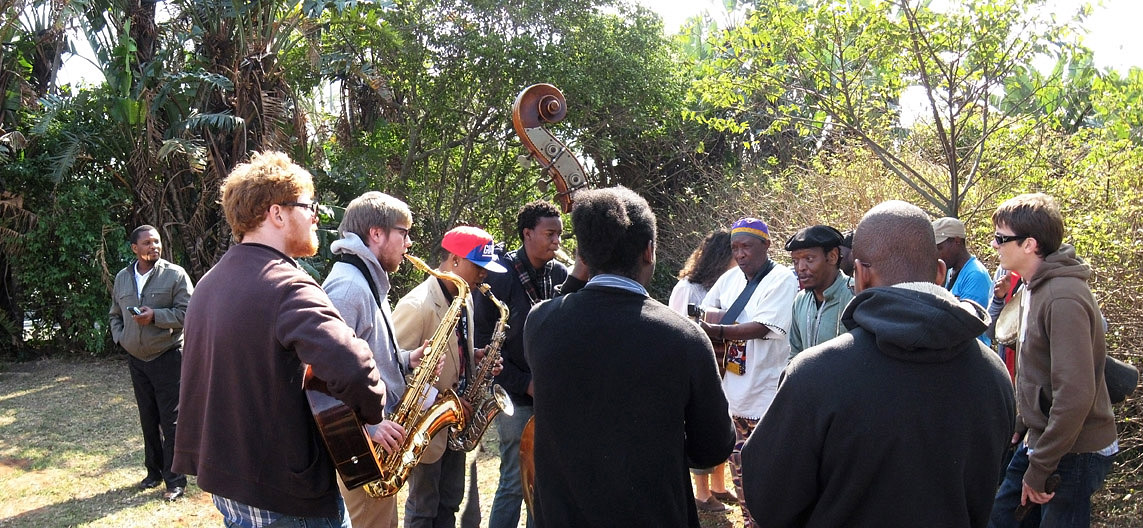
At one point our bassist, Justin, attempted to play the one-string bass, which he later said was the hardest musical instrument he’d ever tried to play.

But we were impressed that the local musician could even walk a blues bass-line for us on it!
It was an inspirational and moving end to the musical part of our day.
We returned to the B&B, gathered our bags, and split up into two vehicles, driven by Neil and a friend of his who was so gracious. Neil saw us into the airport, where we arrived by design three hours ahead of time, and stuck with us as we figured out the baggage way’s home.
At 11:20p, our flight from Joberg took us out of Africa and towards Amsterdam, where we connected the next day to Dulles in DC and shuttled back to Richmond.
I’d like to close with the thoughts of the six UKZN and six VCU students at the center of this experience.
* * *
Sebastian Goldswain (UKZN guitar)
Before the arrival of our American counterparts, we’d all had our own pre-conceived notions of what they would be like, both as people and musicians. And it is indeed a treat to say they confirmed our hopes and crushed any doubts we may have had! The students and Prof. Garcia were a fantastic team to network and spend time with, and I enjoyed every moment the two groups spent together!
Some personal highlights included the long jam on African and American standards late one afternoon (the VCU guys fitting into the African style very well), as well as showing the VCU team the Howard College Campus midday–where, by showing them around and explaining the different cultures, cuisines, and architecture present, I actually got to look in a fresh new way at the campus I see every day!
As players, the VCU team really impressed me with their impeccable professionalism, as well as the very precise manner in which they approach their jazz. As one of the students summarised: “They are not better or worse than our students. They are just different”: a fantastic summary of the July experience for both teams, and a statement that, if resonated through everyone alive, would make for a better world.
* * *
Lungelo Ngcobo (UKZN piano)
I had a great time with the ensemble. The experience with them was better than I had expected. Their playing and improvisational abilities are very impressive to me. The band members’ characters were also very good. I liked the way in which we all became friends easily within just a few minutes.
The whole week was very interesting, since here at school there are hardly any jam sessions. I would love for more experiences like these. I have a lot to learn from those guys!
* * *
Ildo Nandja (UKZN bass)
I had lots of fun the past week with our fellow colleagues from VCU. It was a great opportunity to learn from the VCU students. They are all great musicians, especially Prof. Garcia; and at the same time I shared all I know.
It was amazing: our energies started to engage from the very first time we met–and then grew, not only from playing music together but also getting to know each other. I believe the next step in September will just confirm that and take us to another level, which is what we all desire.
I’m looking forward for our next exchange in September.
* * *
Sakhile Simani (UKZN trumpet)
First of all I must say thank you to Professor Garcia and his students for allowing me to play with them on their concert. It meant a lot to me to share the music with them. I had a great time with the VCU students: we shared and talked about our dreams, ambitions, and futures in music and life. I felt so honoured to be part of the exchange programme. I wish all the best for them. PEACE.
* * *
Linda Sikhakhane (UKZN tenor sax)
I would like to thank the VCU and UKZN staffs for making this possible. I must say that it has been a great pleasure interacting with the jazz cats. This was a great experience for me because I could learn more about American culture and their taste in jazz; that made me realise my direction for my future in music.
That week was so special in such a way that I had to dig more into my cultural experiences and fuse it with the music we play today. I’m so humbled by the great sounds of the VCU team and Prof Garcia’s inspirational words. I’m looking forward into more beautiful moments with the VCU team.
* * *
Sphelelo Mazibuko (UKZN drums)
WOW!! That’s the first thing that came into mind when recalling on the great experience we had with cats (guys) from VCU. The sound of jazz was so realistic to me in that week, sharing thoughts and ideas about jazz and other music genres and seeing the contrast between what’s happening in South Africa and America. I got to realize that this thing called is jazz is so broad, but nevertheless globalization has infiltrated a lot of information into our part of the world. We found a particular common ground in terms of information, and we could relate with our VCU friends.
C.J. Wolfe and I were going through some material that we were checking out for our academic drumming semesters, and we realize that our tutors were using the same or similar material. That for me said that we at UKZN are clearly keeping up with the international scene in information, also getting the sense that we truly are informed and just need to internalize more of the information.
Away from the serious stuff I truly enjoyed the laughter and humour with the guys. In a way it seemed like we have known each other for years, not just meeting each other recently.
Their characters were surely reflected in their playing. It was beautiful music: how they used their information was amazing. It has been an honour to meet one of the world’s beautiful trombonists, Prof. Garcia, who was warm: I enjoyed every note he breathed. This experience was just one of many great encounters.
It has really been an experience I wouldn’t want to forget or replace with anything else. Truly I am looking forward to going to America to experience more of this beautiful and elevating music.
* * *
Victor Haskins (VCU trumpet)
I was able to hear some amazing music made and meet some extremely beautiful people in South Africa during the VCU-KwaZulu Natal University International Exchange.
Having the chance to experience firsthand the culture and music scene in Durban, South Africa was quite special. I was blown away by how strong the spirit of jazz was; and by the end of the weeklong residency, both the VCU students and the KwaZulu Natal students were inspired by each other. Being able to see how awesome the level of performance, arranging, and composition in the jazz idiom was really stuck to me and made me feel good that such a wonderful art form which struggles to exist in its birth-country can be going so strong somewhere–anywhere else in the world. From the classes that we sat in on, it was apparent that the faculty at KwaZulu-Natal University had a wide range of knowledge, experience, and diversity to bring to the students–everything from traditional African musical heritage direct from the source all the way to modern arranging techniques.
Culturally, I was happy to experience such a wide range of things. First, we went on a safari, where it was great to get to see and hear animals living in the wild that one would usually only see in captivity in a zoo. Hearing the distinctive bird-calls (some of the calls reminiscent of laughing human voices) allowed me to make a connection with nature to music and the individualistic nature of playing jazz and “finding one’s voice.” Having a chance to visit a museum in Durban that told the story of apartheid as it had been in that city was humbling and put into perspective exactly how awesome of an accomplishment the University has attained with such a strong program. It has only been a few decades since the end of a time when blacks could not even go the beach as we did after our museum trip (the beach at the Indian Ocean). We had the opportunity also to play traditional African instruments–African flutes, mbiras (African thumb pianos), and other indigenous instruments that acted as precursors to the western acoustic bass and banjo. Finally, we took a bus tour of the townships–the ghettos in Durban that were less than 20 years old–and were able to play some traditional African music with Zulu guitar legend Madala Kunene. All of these experiences were beautiful and led to a clearer picture of another people’s culture and history. This experience, too, has been life-changing and inspiring and acts as a reminder as to how powerful and transcendental music is to the human spirit.
In Durban I was able to have some traditional foods that were spectacular. Of greatest note was the “bunny.” I actually had a mutton bunny from a few different vendors, and this misnomer of a food was something new for me. The bunny is half of a loaf of fresh bread that is hollowed out and filled with whatever you would like, and then the top is replaced to cover the hole from which the bread-innards were extracted. And then the whole thing is eaten like a sandwich. There was also a dessert I really enjoyed (I cannot recall the name) that was made from semolina and had the texture of cream of wheat after it had gotten cold and congealed. The fast food in Durban was also quite good. My favorite place was an African franchise called Nando’s that specializes in chicken. I remembered Nando’s from when I used to live in Zambia; and when I saw that Durban had a Nando’s, I absolutely had to have the well-seasoned, spicy chicken with the soft, fluffy rolls on the side. I hope that my next visit to Durban I will be able to seek out more traditional South African foods, as I am interested in what else is there.
This summer has been amazing, between this trip and my earlier one to participate in the VCU Izmir International Jazz Camp in Turkey. I used to live overseas (the first 11 years of my life were spent overseas, mostly in Asia); and ever since coming the United States, I have dreamt of going back. Even though I have lived amongst many different cultures before, I felt an even deeper sense of being able to connect with those cultures while I was abroad on these trips because now I am old enough and mature enough to appreciate the people I meet and the cultures I am exposed to in any country. When I was younger and I lived amongst different cultures all the time, everything around me seemed more commonplace and “normal.” Also being able to share and experience music with people anywhere in the world is one of the most profound things to be able to do. Music and food, I believe, are the heart of any culture. When you have heard the songs that people sing and tasted the essence of their lives, you can get a good snapshot into what the culture is about; and that is what I feel I have gained through this summer’s activities. Truly profound.
* * *
Trey Sorrells (VCU alto sax)
Durban, South Africa was an extremely beautiful place and very inspirational. From the South African food to the rich warm smiles of everyone in the country, I will never forget the culture that I have visited.
To my surprise, the music scene is happening in Durban and more specifically the University of KwaZulu-Natal. On our first day there we played an afternoon concert; and a ton of students came out to see it and support what we were doing, it really did touch my heart. Every single day after that we enjoyed three concerts (one featuring us); and they were nothing less than amazing. All of the students and alumni were amazing players who taught each and every one of us something new. Simply by watching and listening to these students I was able to comprehend what music means to them. It was inspiring and the lesson will never be forgotten. Among those students, I made a special connection with one who was not on the exchange team: Stephan Le Roux. I am honored to now work with him on a project to perform some of his arrangements in America.
The culture was really an amazing thing. Being an African American I was extremely interested to see how it differed from our culture and if I liked it. I loved everything about the African culture; they are friendly and loving people who tried to make us feel as much at home as possible. The city was beautiful and happening; I enjoyed the museum and learning about African history. The beach was beautiful: I’m so thankful to have been in the Indian Ocean at such a young age. It was so cool to see all the different types of animals that live in Africa, my favorite being ostrich: they are much bigger in person, trust me. One thing that I did not expect was what the trip did for the team’s overall relationship. As we spent time together, we learned more about each other; and this was reflected in our playing throughout the week. This will come in handy for future events.
In conclusion, it was an amazing trip and I would do it all over again. I want to thank everyone who was involved in making this trip happen.
* * *
Brendan Schnabel (VCU tenor sax)
When I first came to VCU three years ago, I never imagined that I would be visiting South Africa. Right up to our landing in Durban, I still did not know what to expect from hosts at KwaZulu-Natal.
I think I speak for everyone when I say how impressive and inspiring the musicians were. Every player was talented, hungry, and–most importantly–excited at the opportunity to play music. There was a musical spirit inherent at the University that was refreshing to all of us. I hope that we as ambassadors can bring some of this spirit back with us to Richmond. We are all very privileged to have this opportunity, and I can think of no better way to wrap up my experience at VCU.
It is hard to believe that after a week of so much great music, cultural revelations, and bonding, both with our friends in Durban and within our own team, that this is only the beginning. Our whole academic year will relate to this exchange, and I cannot wait to see the fruits yet to come. I would like to express my gratitude to Professor Garcia, Professor Gonsalves, and the many others who have made this opportunity possible. Your hard work is greatly appreciated, and we are all ready for the next leg of our intercontinental journey.
* * *
C.J. Wolfe (VCU drums)
One of the first things I noticed upon arriving was how different the American culture was in comparison to the culture of South Africa. In South Africa, it appears people were for the most part happy even while doing everyday tasks. For example, in the airport at Atlanta, people who were serving us food were extremely rude and impolite, as if they did not like their job. When we arrived in Johannesburg, the people who were serving our food were quite the opposite. They were smiling, laughing, and singing songs while they were making the food. Even when we visited the shantytowns in Durban, people were still very happy and smiling. In general, most everyone we contacted was very friendly and open.
On the first day, we saw a group of monkeys running across campus jumping into the trees. Although I was quite intrigued with these “cheeky bastards,” I later learned that they were quite a nuisance. The bed and breakfast had barbed wire and metal bars on the windows to prevent unwanted monkeys from wreaking havoc in our living space.
I was surprised that the steering wheel of the van I was riding in was located on the right side of the car.
One of the unexpected pleasures was being able to meet, have a workshop, and play with Efrain Toro, who is a world-class percussionist. In talking with Efrain, I learned that one of his longtime students was Henry Cole. I have been listening to that drummer, who moved from Puerto Rico to New York City, for the past six months.
Having the opportunity to experience the Tala Game Reserve was remarkable. To see animals such as warthog, rhino, ostrich, zebra, hippo, wildebeest, and impala in their natural habitat was incredible. With each new animal we encountered came many different sounds that I have never heard before. For example, the different birds we encountered would have sounds ranging from a baby’s cry to horn sounds to even cackling and laughing. When it became quiet on the reserve and the wind would blow, I could hear the breeze move the bush; and it would sound like an amazing flush of white noises. The white noise was akin to the sound of a rivet sizzling in a ride cymbal or the swish of a brush on a snare drum. Hearing all the various animal calls made me think about how the first humans developed speech based upon the sounds that each animal made.
It was very fun when the KwaZulu-Natal jazz students took us to a restaurant and we were tapping out rhythms using the tables and glasses. It was interesting to speak with them on a rhythmic level. I studied these rhythms, and I called them Afro-Cuban rhythms despite the fact they were really called African rhythms. When I would say “Afro-Cuban rhythms,” the cats questioned me and replied that Cuba has nothing to do with the rhythms that we were playing. The guys were impressed with my knowledge of the African rhythms and cross-rhythms, and it made me feel like I was on the right track. This was one of the most beneficial experiences because we were able to learn the most about each other in a very relaxed environment.
Another great experience was when we were able to go to Dr. Sazi Dlamini’s office. There were numerous indigenous instruments from the Zulu and South African culture. We were able to play the great-grandfathers of all the instruments that we play today. Having the opportunity to hear a lecture on Madala Kunene was very insightful. The next day we were able to both meet and play with him, which exceeded my expectations completely. Sazi lent me huge seed-pods to use as shakers while playing with Madala, then gave me these seed-pods to bring home. It was amazing to see Madala’s bass player playing songs on one string attached to a wooden box–and Sazi’s brother, who played handmade flutes in addition to penny whistles.
Overall, it is extraordinary to now have friends who I communicate with there. I am able to share ideas on many levels through social-networking sites. This is a once-in-a-lifetime experience that has just begun. I am looking forward to them coming to the United States and our sharing so much with them as they did with us.
I can’t wait to go back to Durban. This has been a remarkable experience that I will remember for the rest of my life, and I am very fortunate.
* * *
Chris Ryan (VCU guitar)
Summing up our trip in a few paragraphs seems like a difficult challenge. We shared so many amazing experiences in one week.
One thing that struck me even from the airport Johannesburg was the sense of joy radiating from the people. People were greeting us with smiles everywhere, which felt like a stark contrast to the airports in the states. Another thing that stuck with me was the level of hospitality and generosity bestowed upon us from our hosts. From the time we arrived in Durban we were looked out for by Prof. Neil Gonsalves and his wife, Nareen, as well as our companion students–and in general the students and faculty at UKZN. I feel very grateful for the hospitality we received.
A few of the memories that stuck out for me were The Laughs! We were lucky to be traveling with such a great group on our end! We did a great amount of laughing and enjoying each other’s company, which made for a good time in itself.
The Music! Where to start? There was so much good music. I particularly enjoyed the vocalist from the first concert we caught. I was impressed in general with the UKZN students’ ability to perform traditional jazz music: those cats can play! The Jam Sessions! What a great time making music with that gang! The Friendships: I truly feel as though I left Africa now having friendships on two continents. The Safari! Of course, what an amazing experience–and an equally amazing guide in Dr. Jeff Robinson.
It is hard to say what the best parts of the trip were; there truly are just so many wonderful memories. For me, our interaction with Prof. Sazi Dlamini was very special. From his class on Maskandi guitar hero Madala Kunene, then Sazi’s leading us in a jam session with indigenous African instruments, and perhaps the high point of the trip: going on a tour of Madala’s homeland with Madala himself!
When we arrived in the shanty village, Sazi addressed the situation of poverty we were surrounded by. He said something to the effect that all though these people are poor, they are a people of hope. That message was so clear: these people had only the slightest of worldly possessions, but they had hope, hope that they could achieve. It made the smiles and sense of joy from the airport come full-circle.
* * *
Justin Esposito (VCU bass)
Durban, South Africa is a cultural gem in the world. The different races and eleven different languages spoken definitely took me by surprise because they brought upon the realization that there were so many cultural roots I was completely unfamiliar with and unrelated to. This being my first international trip outside of the country, I didn’t know what I would find out about the world and myself. This trip granted to the VCU Jazz Program has allowed the seven of us to tap into a world so unfamiliar, yet a place that we were able to grow into as musicians and individuals.
As we walked around a foreign campus, most others’ eyes were fixated on our passing with a curiosity as to who we might be and why we were there: that was a common occurrence. But then I began to realize that our trip to South Africa granted by Virginia Commonwealth University was about tapping into that curiosity and finding out who _you_ are and why _your_ experiences have brought you to this point in time.
This “Cultural and Educational Exchange” broke down interaction with people from a dauntingly different background in a very beautiful and manageable way. I use the word beautiful because my interaction with the UKZN team, faculty, and other students was nothing but passionate and exciting, learning the small differences and huge similarities musicians across borders share. I have never been able to cross-compare values, morals, and ambitions on the small and grand scale. This cultural exchange taught me how to communicate to others my views of cultural representation and values that I had obtained in the United States. At the same time, I learned how to not push my values upon others who differ, but to use my characteristics of morality and student-skills to paint a portrait of whom I am developing into through my journeys in higher education.
It is not everyday that students are heavily investing into culturally exchanging their representation of a VCU student into the world. But this trip allowed my to make my mark on another place in the word with my passion: music.
* * *
The trip now over, much excitement remains ahead. The UKZN team visits VCU the last week of September, and we are looking forward to hosting our new friends! Commissioned musical works follow, as well as their rehearsals and the continual exchange of resources, dialogues, and even musical ideas via the internet. The VCU team returns to Durban in early March 2013, including performing a joint concert on Wednesday, March 6 in Durban. In late March the UKZN team visits VCU, including performing a joint concert Thursday, March 28. Both concerts will be recorded for selective inclusion in a jointly released CD that I will produce mid-2013.
And then we see what activities we might be able to find a way to carry over into future years! Certainly all involved at both schools have already established solid friendships and the interest in staying connected, musically and personally.
Best,
Tony
Antonio J. Garcia is Director of Jazz Studies at Virginia Commonwealth University.
Categories VCU/UKZN Trip 1